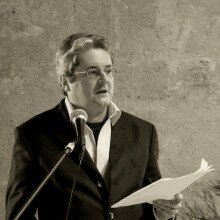
Peter Sirr, a freelance writer and translator, is one of Ireland’s most enlivening contemporary poetic voices. Published by the Gallery Press, he has to date produced seven collections of poetry since his 1984 debut collection Marginal Zones announced the arrival on the scene of a refreshing poetic talent. Sirr is also a most necessary critical voice in contemporary poetry and his editorship (from 2003-2007) of the magazine Poetry Ireland Review reflected his own sense of the ‘internationalism that is the lifeblood of poetry’ as he set about privileging work in translation and opening the magazine up and out onto the world of poetry beyond national boundaries. As he wrote in a retrospective of his years at the helm of PIR: ‘Those who assume the exceptionality of Irish poetry will witter on about the lines of influence from Yeats to Heaney to Muldoon and ignore the fact that Montale, Pessoa, Celan, Bonnefoy and a host of other unacknowledged legislators have long since gatecrashed the party.’
Indeed, it is surely not insignificant that the first poem to be published in his first issue as editor of the Review was Paul Muldoon’s ‘The Coyote’. The boundlessly inventive, boundary-flouting Muldoon is surely an important transnational trailblazer for Sirr’s own expansive and exhilarating poetic adventures.
Reviewing Sirr’s Selected Poems in 2005, Aingeal Clare identified how ‘each of Sirr’s six collections to date possesses the same sense of adventure and Continental vivacity that make for such distinctive and exciting writing.’ Sirr’s linguistic excursions centre more and more on and around the modern city, in poems that pivot on a profound engagement with the shifting cityscape as a fluid experience of music, movement and meaning. Indeed, reviewers of Sirr’s Bring Everything (2000) attributed its critical import to the way that it placed Dublin city centre-stage. In this way, Sirr may be seen to be following in the footsteps of Thomas Kinsella, the pre-eminent poet of Dublin, in whose work Sirr has identified an ‘intense and multi-faceted relationship with several Dublins’.
As a perceptive reader of poetry, Sirr’s critical focus is often drawn to fellow city-poets. Hailing the ‘brilliantly adventurous’ French poet Jacques Réda for the way that he ‘reinvents the tradition of the flâneur, prowling the streets' through a ‘densely textured and richly musical’ technique, Sirr neatly encapsulates his own poetics of the city-as-cosmos as he, like Réda, ‘sets himself afloat to drink in the sense data of the streets’.
Readers of Sirr’s poetry have also found themselves being led compulsively by their ears. In a 2005 review for the TLS, Peter Robinson astutely observed how ‘to get [his] evolving sound, Sirr had [. . .] to strike out into blocks of responsively improvised verse.’ Formally regenerative, Sirr’s sonic weave of free verse conveys the city’s dazzling, disorienting plurality over dizzying lines driven by propulsive sound and sense effects of internal rhyme and repetition.
Throughout his most recent collection The Thing Is (2009) we follow Sirr through the experience of new-fatherhood in ambulatory poems through Dublin city that metaphorically become the progress of life itself. Here, the critical tendency to pair Sirr with the American poet Frank O’Hara seems appropriate, as the poet-as-father becomes O’Hara-esque in his elegy for the city in its passing and for the synchronous passing of childhood. ‘Everything we know will disappear with us’, the speaker realises, yet, ‘perfectly at home in the scatter’ the child, in her reversible dress, accommodates herself to the constantly changing city, and so to the processes of death. The collection ends with an assurance of ‘the brutal, lovely / persistence of the city’ in ‘Carmina’ which translates Catullus to contemporary Dublin. Reviewing this collection for the Irish Times, Philip McDonagh deemed it ‘a celebration of children and creativity [. . .] in which Sirr, MacNeice-like, captures our current reality.’
James Joyce once professed to being ‘more interested in the Dublin street names than in the riddle of the universe’ and Sirr’s similar cast of mind makes for poetry of inventive and imaginative reach. For Sirr, the process of poetic composition is an ‘adventure’ with ‘no real maps, no sure paths’; truly he is an intrepid and invigorating critical and creative force in Irish contemporary poetry.
Select Bibliography
The Ledger of Fruitful Exchange, Gallery Press, Oldcastle, 1995
Bring Everything, Gallery Press, Oldcastle, 2000
Selected Poems, Gallery Press, Oldcastle, 2004
Nonetheless, Gallery Press, Oldcastle, 2004
The Thing Is, Gallery Press, Oldcastle, 2009
Links
Peter Sirr's Website
Peter Sirr at Gallery Press

